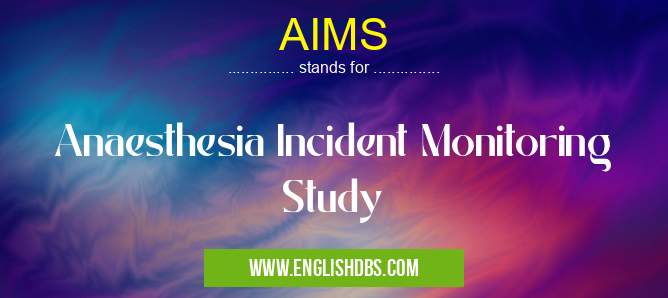What does AIMS mean in HOSPITALS
AIMS stands for Anaesthesia Incident Monitoring Study. It is a large-scale prospective study designed to collect and analyze data on anesthesia incidents and near-misses in the United Kingdom. The study aims to identify the frequency, causes, and consequences of anesthesia incidents, and to develop strategies to prevent future incidents.

AIMS meaning in Hospitals in Medical
AIMS mostly used in an acronym Hospitals in Category Medical that means Anaesthesia Incident Monitoring Study
Shorthand: AIMS,
Full Form: Anaesthesia Incident Monitoring Study
For more information of "Anaesthesia Incident Monitoring Study", see the section below.
AIMS Methodology
AIMS is a voluntary study that involves over 200 hospitals in the UK. Participating hospitals collect data on all anesthesia incidents and near-misses that occur in their operating rooms. The data is then submitted to a central database for analysis.
AIMS Findings
The AIMS study has found that anesthesia incidents are relatively rare, but they can have serious consequences. The most common types of anesthesia incidents include:
- Equipment-related incidents
- Human error
- Patient-related factors
The AIMS study has also found that anesthesia incidents are more likely to occur in certain types of surgery, such as:
- Emergency surgery
- Cardiac surgery
- Neurosurgery
AIMS Recommendations
The AIMS study has made a number of recommendations to prevent anesthesia incidents, including:
- Improving equipment safety
- Reducing human error
- Optimizing patient care
Essential Questions and Answers on Anaesthesia Incident Monitoring Study in "MEDICAL»HOSP"
What is AIMS (Anaesthesia Incident Monitoring Study)?
AIMS is a large-scale, ongoing study that collects data on incidents and near-misses during anaesthesia. The aim of AIMS is to improve patient safety by identifying and understanding the factors that contribute to these events.
Why is AIMS important?
Anaesthesia is a complex and high-risk medical procedure. AIMS provides valuable data that can help to improve the safety of anaesthesia and reduce the risk of patient harm.
What types of incidents does AIMS collect data on?
AIMS collects data on a wide range of incidents, including:
- Patient deaths
- Serious injuries
- Near-misses
- Equipment failures
- Drug errors
- Human errors
How is AIMS data collected?
AIMS data is collected through a variety of methods, including:
- Incident reporting forms
- Anaesthetic records
- Interviews with healthcare professionals
- Observational studies
How is AIMS data used?
AIMS data is used to:
- Identify trends and patterns in anaesthesia incidents
- Develop strategies to prevent future incidents
- Improve the training and education of healthcare professionals
- Inform policy decisions
Is AIMS data confidential?
Yes, AIMS data is strictly confidential. All patient and healthcare professional information is anonymized before it is used for research purposes.
How can I participate in AIMS?
Healthcare professionals can participate in AIMS by reporting incidents and near-misses to the AIMS database. Patients can participate by providing consent for their data to be used for research purposes.
Final Words: The AIMS study is an important source of information on anesthesia incidents. The study's findings have helped to improve the safety of anesthesia care in the UK. The AIMS study is ongoing, and it is expected to continue to provide valuable insights into the causes and prevention of anesthesia incidents.
AIMS also stands for: |
|
| All stands for AIMS |
